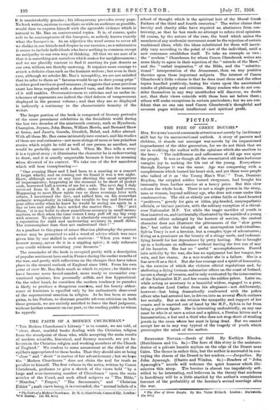THE FAITH OF A MODERN CHURCHMAN.*
"Tax Modern Churchman's Library" is to consist, we are told, of "clear, short, truthful books dealing with the Christian religion from the standpoint of those who, while accepting the main results of modern scientific, historical, and literary research, are yet be- lievers in the Christian religion and working members of the Church of England." We confess to some amusement at the third of the epithets appropriated to these books. That they should aim at being " clear " and " short " is matter of fair advertisement ; but we hope the "Modern Churchman" does not claim the zeal for truth as peculiar to himself. The first volume in the series, written by Canon Glazebrook, professes to give a sketch of the views held "by a large and ever-increasing number of Churchmen" upon the main 'articles of the Creed, and such allied subjects as "The Bible," "Miracles," "Prayer," "The Sacraments," and "Christian Ethics"; such views being, it is contended, the "normal beliefs of a • The of a Modern Churchman. Ds.51. 0. Obsebrook, Canon of Ely. London: Tolle Idtaray. its. 6d. nct.1 school of thought which is the spiritual heir of the liberal Greek Fathers of the third and fourth centuries." The writer claims that brevity and charity alike have required an abstinence from con- troversy, so that he has made no attempt to refute rival opinions. Of course, by the nature of the case, the bond which unites the members of any modernist movement must be the rejection of certain traditional ideas, while the ideas substituted for them will inevit- ably vary according to the point of view of the individual, until a new consensus establishes itself. To take an example or two : the " modern " Churchmen for whom Canon Glazebrook writes are more likely to agree in their rejection of the "miracle of the Mass," and the "verbal inspiration" of the Bible, and the " substitu- tional " interpretation of the Atonement, than on' any positive theories upon these important subjects. The interest of Canon Glazebrook's little volume is that he does treat' these and the other topics handled positively, basing his views upon the ascertained results of philosophy and criticism. Many readers who do not eon- alder themselves in any way unorthodox will discover, we doubt not, that their views coincide with those here set before them ; others will make exceptions in certain particulars ; but we are con- fident that no one can read Canon Glazebrook's thoughtful and reverent pages without intellectual and spiritual profit.


































 Previous page
Previous page